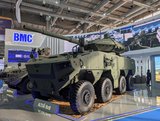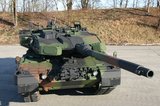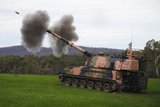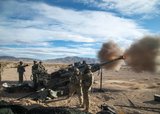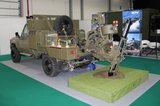New bridges ordered for British Army
The DSB can be deployed by eight personnel to span a 46m gap in under 90 minutes. (Photo: WFEL)
The British Army will replace its BR90 ABLE bridging systems with KNDS UK (Krauss-Maffei Wegmann and Nexter) mobile bridges based on the company’s Dry Support Bridge (DSB) design and mounted on Rheinmetall MAN Military Vehicle (RMMV) HX2 tactical trucks.
The deal, worth £150 million (US$191 million), will provide bridges with a range of 46m and able to carry the weight of the army’s future tank, the Challenger 3. It will be able to cross both wet and dry gaps.
The new capability will be interoperable with other NATO partners’ bridge systems, meaning that resources can be shared between nations during joint exercises and deployments.
The procurement has been part of as part of Project Tyro which will provide a capability improvement for the British Army, facilitating the mobility of future Armoured Brigade Combat Teams and equipment across gaps in the terrain.
WFEL, now part of KNDS, was left as the last bidder in mid-2023. A DSB set consists of a launcher vehicle, six flat-track loads of bridge components and one flat-track load of launch beams.
The DSB has been sold to a number of other countries including Australia (RMMV 10x10), the Philippines (RMMV 10x10), Switzerland (Iveco Trakker 10x8) and Turkey (HEMTT).
More from Land Warfare
-
![US Army plans Q2 prototype proposal request for its Mobile Tactical Cannon programme]()
US Army plans Q2 prototype proposal request for its Mobile Tactical Cannon programme
The US Army is seeking a mature 155mm, wheeled, self-propelled capability to replace the towed M777 howitzer in the Stryker, Mobile and Infantry Brigade Combat Teams as it targets a potential 498-unit acquisition goal.
-
![British Army’s Project Stokes 120mm mortar bids due in March 2026]()
British Army’s Project Stokes 120mm mortar bids due in March 2026
Project Stokes could see a new 120mm mortar capability enter British service, with domestic production and international partnerships central to competing bids.
-
![MKJ Warrior Series — The Nett Warrior Qualified Connector for Today’s Soldier Systems]()
MKJ Warrior Series — The Nett Warrior Qualified Connector for Today’s Soldier Systems
ITT Cannon’s MKJ Warrior connectors are designed for the harshest environments, delivering mission critical comms, navigation and USB data/power.









